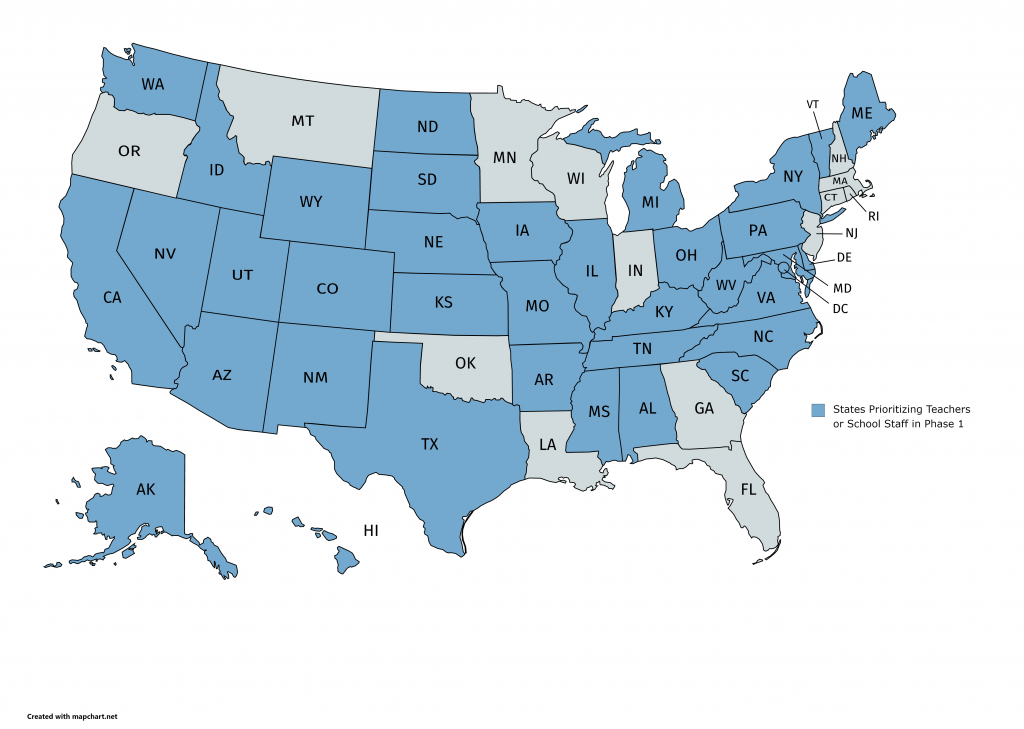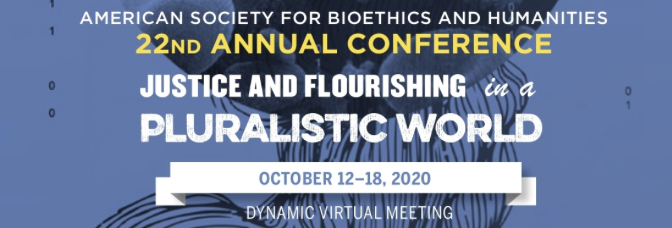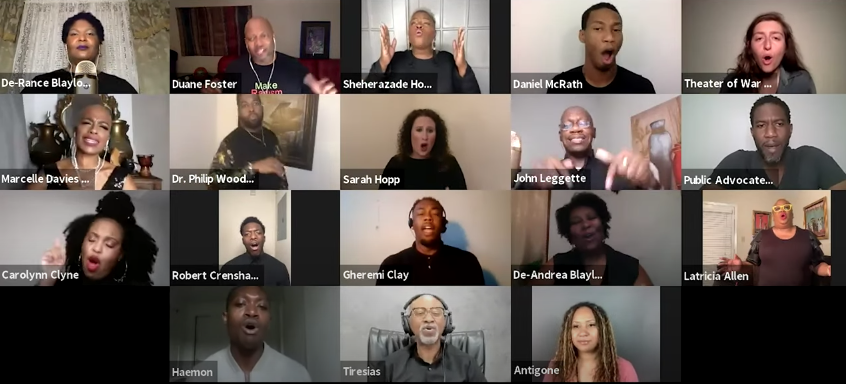How are Teachers Prioritized for COVID-19 Vaccination by the US States?
Matthew A. Crane, Ruth R. Faden, Megan E. Collins
This post reflects information on vaccination planning collected on January 12, 2021.
As states contend with limited initial supply of COVID-19 vaccines, prioritization decisions are being made about local distribution. Many current prioritization decisions reflect guidance from the National Academies of Sciences, Engineering, and Medicine (NASEM), as well as the Advisory Committee on Immunization Practices (ACIP). However, the states have the authority to allocate vaccine as they see fit. Currently available state planning is highly dynamic, and subject to change.
One priority group for vaccination, teachers, has been the subject of scrutiny in recent weeks, with some education groups advocating that teachers and school staff be moved up in prioritization plans, relative to other groups. Because of this advocacy, and especially ACIP’s recent decision to recommend teachers and school staff for Phase 1b of vaccination, states that do not currently include the K-12 workforce in Phase 1 may reconsider their current prioritization.
In order to understand where teachers and school staff stand in current vaccination plans, we conducted an analysis of available COVID-19 vaccination planning from all fifty States and Washington D.C. For this search, we used the most-recent available information from state websites or health agencies about Phase 1 prioritization. Keywords for inclusion included “teachers,” “school staff,” and “education.” For each jurisdiction with available data in planning documents, we collected information about the subphase in which teachers or school staff are listed, as well as the exact language used. Sources included for this analysis are available in the Appendix.
As of January 12, 2021, 37 of 51 jurisdictions include teachers and/or school staff in vaccination planning for Phase 1 vaccination (Table 1). Language varies widely between jurisdictions, with exact language presented in Table 2. Teachers are most commonly prioritized in Phase 1b. Utah was the only state to have an undivided Phase 1 among these 37, and in that state teachers were included along with multiple other groups of high risk and essential workers. These results show an increase from an earlier collection of plans on December 19, 2020, where we found that only 23 of 51 jurisdictions prioritized teachers and/or school staff for Phase 1 vaccination.
Table 1: Phase 1 Prioritization of Teachers and School Staff in the United States (as of 1/12/21)
| Subphase | # of Jurisdictions | Jurisdictions Prioritizing Teachers for Phase 1 |
| Phase 1 | 1 | UT a |
| Phase 1a | – | No States |
| Phase 1b | 34 | AL, AK, AZ, AR, CA, CO, DE, HI, ID, IL, IA, KS, KY, ME, MD, MI, MS, MO, NE, NV, NM, NY, NC, ND, OH, PA, SC, TN, TX, VT, VA, DC, WA, WY |
| Phase 1c | – | No States |
| Phase 1d | 2 | SD, WV |
a Utah has no Phase 1 subphase listed for teachers
These findings have limitations. They are limited to published prioritization information on government websites (recently updated full state plans, webpages, and phase 1-specific documents). We did not analyze all sources available, such as meeting minutes or recordings of ongoing discussions, or secondary sources such as news coverage. Additionally, state vaccination plans are being updated frequently, and may change in response to additional CDC guidance based on recent ACIP recommendations. Due to these limitations, caution should be exercised in interpreting the prioritization decisions from states which have not updated guidance documents recently. Furthermore, some states have not yet made their guidance on teacher sub-phase explicit. In these instances, our categorizations are based on best estimates of Phase 1 sub-phases from currently available information

Table 2: Jurisdictions Prioritizing Teachers for Phase 1 Vaccination (as of 1/12/21)
| Jurisdiction | Subphase | Language about Teachers | Sources
(version, date last updated if available) |
| Alabama | 1b | “Education sector (teachers, support staff members)” | Vaccination Allocation Plan
(1/11) |
| Alaska | 1b | “Education (Pre K-12 educations and school staff)” | Vaccine Allocation Guidelines
(1/4) |
| Arizona | 1b | “Education (K-12) and childcare workers” | County Health Department Website |
| Arkansas | 1b | “Teachers and school staff” | State Health Department Website |
| California | 1b | “Education” | State Website |
| Colorado | 1b | “Frontline essential workers in Education” | State Website |
| Delaware | 1b | “Education (teachers, support staff, daycare)” | State Vaccination Playbook
(1/7) |
| Hawaii | 1b | “Teachers and childcare and educational support staff (childcare, early education, K-12, post-secondary)” | State Plan Executive Summary |
| Idaho | 1b | “Pre-K-12 school staff and teachers and daycare [childcare] workers” | Advisory Committee Slides
(12/9) |
| Illinois | 1b | “Education (Congregate Child Care, Pre-K through 12th grade): Teachers, Principals, Student Support, Student Aids, Day Care Workers.” | State Website |
| Iowa | 1b | “Teachers/school staff” | State Vaccination Strategy
(V2, 12/4) |
| Kansas | 1b | “K-12 and Childcare Workers, including teachers, custodians, drivers and other staff” | Vaccine Prioritization Plan (1/7) |
| Kentucky | 1b | “K-12 School Personnel” | Vaccine Phases Update
(1/4) |
| Maine | 1b | “Education sector (teachers, and support staff) | State Website
(1/12) |
| Maryland | 1b | “Education, including K-12 teachers, support staff, and daycare providers” | Vaccine Distribution Announcement
(1/8) |
| Michigan | 1b | “School and child care staff” | Prioritization Guidance
(1/6) |
| Mississippi | 1b | “K-12 Teachers/Staff; College/University Teachers/Staff” | State Website |
| Missouri | 1b | “Teachers & Education Staff” | State Website |
| Nebraska | 1b | “Education (teachers, support staff, daycare)” | State Website |
| Nevada | 1b | “Educators in pre-school and K-12 settings, including teachers, aides, special education and special needs teachers, ESOL teachers, and para-educators; workers who provide services necessary to support educators/students, including but not limited to administrators, administrative staff, IT staff, media specialists, librarians, guidance counselors, essential workers in the Nevada Dept. of Education, etc.; workers who support the transportation and operational needs of school settings, including bus drivers, crossing guards, cafeteria staff, cleaning and maintenance staff, and bus depot and maintenance staff.” | State Playbook
(V3, 1/11) |
| New Mexico | 1b | “Early education and K-12 educators/staff” | State Website |
| New York | 1b | “P-12 school or school district faculty or staff (includes all teachers, substitute teachers, student teachers, school administrators, paraprofessional staff and support staff including bus drivers)
Contractors working in a P-12 school or school district (including contracted bus drivers)” |
State Website |
| North Carolina | 1b | “Education Sector (teachers and support staff members)” | State Website |
| North Dakota | 1b | “Workers employed by preschools or Kindergarten through 12th grade: Teachers, nutritional services, aides, bus drivers, principals, administrative staff, custodians, etc.” | State Website |
| Ohio | 1b | “Adults/employees in all schools that want to go back, or to remain, educating in person.” | State Website |
| Pennsylvania | 1b | “Education workers” | State Website |
| South Carolina | 1b | “Those who work in the educational sector—teachers, support staff, and daycare workers” | State Website |
| South Dakota | 1d | “Teachers and other school/college staff” | State Website |
| Tennessee | 1b | “Childcare, pre-school, and kindergarten through twelfth grade teacher, school staff, and school bus drivers” | Vaccination Plan (V3, 12/30) |
| Texas | 1b | “Teachers and school staff who ensure that Texas children can learn in a safe
Environment” |
Phase 1B Guidance |
| Utah | 1 | “K-12 teachers and school staff” | State Website |
| Vermont | 1b | “Education Sector” | Vaccination Plan
(V2, 12/28) |
| Virginia | 1b | “Childcare/PreK-12 Teachers/Staff” | State Website |
| Washington D.C. | 1b | “School teachers and staff” | Phase 1 Guidance
(12/28) |
| Washington | 1b | “K-12 educators and staff during in-person schooling” | Guidance Summary (1/7) |
| West Virginia | 1d | “Higher education and K-12 Faculty and Staff” | State Website |
| Wyoming | 1b | “K-12 Education (teachers and support staff)” | Vaccination Priorities
(12/30) |
Acknowledgement:
The structure of this analysis was inspired by the work of the Prison Policy Initiative on tracking incarcerated people and corrections staff in vaccination plans.
Appendix: Sources for Information on Prioritization of Teachers and School Staff for Phase 1 of COVID-19 Vaccination



